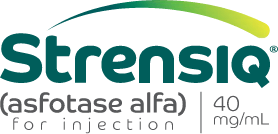
Juliana, Living with Hpp
STRENSIQ REPLACES
WHAT’S MISSING
As the only FDA-approved enzyme replacement therapy for people with perinatal/infantile-onset and juvenile-onset hypophosphatasia (HPP), STRENSIQ® (asfotase alfa) replaces alkaline phosphatase (ALP) and improves bone health.
ALP HELPS FORM HEALTHY BONES

ALP HELPS FORM HEALTHY BONES
Calcium and phosphate are two of the essential components needed to create and maintain healthy bones. ALP helps mineralize bone by freeing phosphate so it can combine with calcium and form the building blocks needed to make bones.
Bone mineralization is the process of minerals working together to develop bones. This involves many specific steps that need to be followed in order for bones to reach the right hardness, strength, and size.
STRENSIQ REPLACES ALP
Because people with HPP don’t have enough of the ALP enzyme, phosphate isn’t free to bind with calcium to form healthy, mineralized bones. As a result, people with HPP have soft or weak bones.

People born with HPP don’t have enough active ALP enzyme, which is needed to “mineralize” bones.

STRENSIQ replaces the ALP your body needs to build healthy bones.

STRENSIQ frees phosphate so it can combine with calcium to form the building blocks needed to make bone.

Calcium and phosphate work together to build healthier, stronger bones.

REPLACE WHAT’S MISSING
STRENSIQ HELPS FORM HEALTHY BONES
STRENSIQ can replace the ALP your body needs to free phosphate (PO4) and allow it to
bind together with calcium (Ca) to build healthy bones.


STRENSIQ treats people with perinatal/infantile-onset and juvenile-onset HPP, but it is important to note that every person is different. Responses to treatment may vary.
When symptoms manifest in utero and are apparent at birth it is perinatal-onset HPP. Someone who experiences symptoms before 6 months of age is living with infantile-onset HPP. Someone who experiences symptoms between the ages of 6 months and 18 years old is living with juvenile-onset HPP.

HPP PATIENT SUPPORT
Enroll in OneSource™ to get personalized patient support from Alexion at 1.888.765.4747.
Learn More about OneSource™

AT ONESOURCE, WE ARE BY YOUR SIDE THROUGHOUT YOUR JOURNEY, FROM LEARNING ABOUT YOUR CONDITION TO HELPING YOU ACCESS THE THERAPY YOU'VE BEEN PRESCRIBED. PATIENTS' NEEDS ARE OUR TOP PRIORITY.
–Deana,
ONESOURCE CASE MANAGER


STRENSIQ CAN HELP PEOPLE LIVING WITH HPP
See how STRENSIQ may improve bone health, mobility, and more.
What is the most important information I should know about STRENSIQ® (asfotase alfa)?
STRENSIQ may cause serious side effects, including severe allergic (hypersensitivity) reactions. Allergic reactions are common with STRENSIQ treatment and can be severe and life-threatening. Severe allergic reactions have happened in some people within minutes after receiving STRENSIQ and more than 1 year after starting treatment with STRENSIQ. Stop using STRENSIQ and go to the nearest hospital emergency room right away if you or your loved one get any of the following signs and symptoms of a serious allergic reaction:
- difficulty breathing
- choking sensation
- swelling of your eyes, lips, or tongue
- dizziness
- nausea or vomiting
- fever
- headache
- sweating
- feeling irritable
- chills
- skin redness
- skin rash or hives
-
itching or numbness of the
tongue, lips, cheeks, or gums
What are the other possible side effects of STRENSIQ?
STRENSIQ may cause other serious side effects, including:
- skin thickening or pits at the injection site (lipodystrophy). Lipodystrophy is common and has happened after several months in people treated with STRENSIQ.
- calcium build-up in the eyes and kidneys. People with HPP are at increased risk for developing calcium build-up in the body. Calcium build-up in the eyes and kidneys has happened and is a common side effect of STRENSIQ. Calcium build-up in the eyes and kidneys may also happen in people with HPP who are not treated with STRENSIQ. Your healthcare provider should check your eyes and kidneys before and during treatment with STRENSIQ.
- immune-related effects. You may develop antibodies during treatment that may decrease how well STRENSIQ works. Tell your healthcare provider right away if you get worsening symptoms of HPP including: difficulty breathing, difficulty walking, feeling tired, bone pain, stiff joints, or loss of appetite.
The most common side effects of STRENSIQ include local skin injection site reactions such as skin redness, bruising, color change, pain, itching, hardening of the skin (induration), swelling, and bumps. These are not all the possible side effects of STRENSIQ. For more information, ask your healthcare provider or pharmacist. Call your healthcare provider for medical advice about side effects.
You will begin receiving STRENSIQ under the supervision of a healthcare provider. Tell your healthcare provider about all your medical conditions, including if
you:
- have had an allergic reaction to STRENSIQ.
- are pregnant or plan to become pregnant. It is not known if STRENSIQ will harm your unborn baby.
- are breastfeeding or plan to breastfeed. It is not known if STRENSIQ passes into your breast milk. Talk to your healthcare provider about the best way to feed your baby if you use STRENSIQ.
Tell your healthcare provider about all the
medicines you
take,
including
prescription and over-the-counter medicines,
vitamins, and herbal
supplements.
There is a registry for people who use STRENSIQ. The purpose of this registry is to collect information about HPP and about what happens when you use STRENSIQ for a long time. For more information about this registry, talk with your healthcare provider or go to www.hppregistry.com.
To report SUSPECTED SIDE EFFECTS, contact Alexion
Pharmaceuticals, Inc. at
1-844-259-6783 or FDA at
1-800-FDA-1088
or
www.fda.gov/
medwatch.
INDICATION
What is STRENSIQ?
STRENSIQ® (asfotase alfa) is a prescription medicine
used to
treat people
with perinatal, infantile, and juvenile onset
hypophosphatasia (HPP).
Please see the full Prescribing Information and Patient Information, including Boxed WARNING regarding severe allergic (hypersensitivity) reaction.
What is the most important information I should know about STRENSIQ® (asfotase alfa)?
STRENSIQ may cause serious side effects, including severe allergic (hypersensitivity) reactions. Allergic reactions are common with STRENSIQ treatment and can be severe and life-threatening. Severe allergic reactions have happened in some people within minutes after receiving STRENSIQ and more than 1 year after starting treatment with STRENSIQ. Stop using STRENSIQ and go to the nearest hospital emergency room right away if you or your loved one get any of the following signs and symptoms of a serious allergic reaction:
- difficulty breathing
- choking sensation
- swelling of your eyes, lips, or tongue
- dizziness
- nausea or vomiting
- fever
- headache
- sweating
- feeling irritable
- chills
- skin redness
- skin rash or hives
-
itching or numbness of the
tongue, lips, cheeks, or gums
What are the other possible side effects of STRENSIQ?
STRENSIQ may cause other serious side effects, including:
- skin thickening or pits at the injection site (lipodystrophy). Lipodystrophy is common and has happened after several months in people treated with STRENSIQ.
- calcium build-up in the eyes and kidneys. People with HPP are at increased risk for developing calcium build-up in the body. Calcium build-up in the eyes and kidneys has happened and is a common side effect of STRENSIQ. Calcium build-up in the eyes and kidneys may also happen in people with HPP who are not treated with STRENSIQ. Your healthcare provider should check your eyes and kidneys before and during treatment with STRENSIQ.
- immune-related effects. You may develop antibodies during treatment that may decrease how well STRENSIQ works. Tell your healthcare provider right away if you get worsening symptoms of HPP including: difficulty breathing, difficulty walking, feeling tired, bone pain, stiff joints, or loss of appetite.
The most common side effects of STRENSIQ include local skin injection site reactions such as skin redness, bruising, color change, pain, itching, hardening of the skin (induration), swelling, and bumps. These are not all the possible side effects of STRENSIQ. For more information, ask your healthcare provider or pharmacist. Call your healthcare provider for medical advice about side effects.
You will begin receiving STRENSIQ under the supervision of a healthcare provider. Tell your healthcare provider about all your medical conditions, including if
you:
- have had an allergic reaction to STRENSIQ.
- are pregnant or plan to become pregnant. It is not known if STRENSIQ will harm your unborn baby.
- are breastfeeding or plan to breastfeed. It is not known if STRENSIQ passes into your breast milk. Talk to your healthcare provider about the best way to feed your baby if you use STRENSIQ.
Tell your healthcare provider about all the
medicines you
take,
including
prescription and over-the-counter medicines,
vitamins, and herbal
supplements.
There is a registry for people who use STRENSIQ. The purpose of this registry is to collect information about HPP and about what happens when you use STRENSIQ for a long time. For more information about this registry, talk with your healthcare provider or go to www.hppregistry.com.
To report SUSPECTED SIDE EFFECTS, contact Alexion
Pharmaceuticals, Inc. at
1-844-259-6783 or FDA at
1-800-FDA-1088
or
www.fda.gov/
medwatch.
INDICATION
What is STRENSIQ?
STRENSIQ® (asfotase alfa) is a prescription medicine
used to
treat people
with perinatal, infantile, and juvenile onset
hypophosphatasia (HPP).
Please see the full Prescribing Information and Patient Information, including Boxed WARNING regarding severe allergic (hypersensitivity) reaction.


